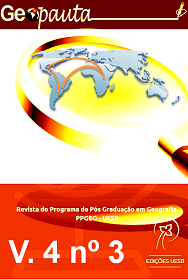Black Feminisms: Epistemic Debates and Political Challenges
DOI:
https://doi.org/10.22481/rg.v4i3.7484Keywords:
Black feminisms. Racism. Systemic and political positioning.Abstract
This article focuses on black feminisms assumed multidimensionally in the diversity of their components, contexts, theoretical contributions, social subjects, platforms and strategies of struggles. The objective is to analyze the epistemic and political debates that they lead, in the face of “Amefricanity” and its current challenges. It outlines the positioning of these feminisms, putting in tension the path traveled in the face of invisibility. Values the current reconfiguration of racism, traversed by a process of social mobilization, under construction, and the "debts of equality" with Afro-descendants. The challenges that create new opportunities and alternatives for struggle are reconsidered. Thus, it promotes the thesis of rethinking the International Decade of Afro-descendant peoples, rescuing the Durban program in a decolonial Afro-feminist key.
Downloads
Metrics
References
Abad, G. (2012). Juan García y Juan Montaño: territorios distintos y narrativas complementarias desde la memoria afrodescendiente. Chasqui Revista Latinoamericana de Comunicación, (120), 88-92. www,redalyc.org/articulo.0a?id signo igual16057414019
Campoalegre, R. (Coord). (2017).Más allá del decenio de los pueblos afrodescendientes. En Campoalegre R. y Bidaseca, K. (Coords) Buenos Aires: CLACSO,
Campoalegre, R. (2019). ¿Qué nos aportan los feminismos negros? Breves notas para un debate. En Seminario virtual 1962 Feminismos negros: perspectivas críticas desde América Latina y el Caribe. Recuperado de http:// www/clacsovirtualorg
Campoalgre, R. (Coord. (2020). La Pandemia racializada. En Ancestralidades, Antirracismo y Actualidades, ( I, 2, 3). R ecuperado de https://www.clacso.org/boletin-1-ancestralidad-antirracismo-y-actualidades-la-pandemia-racializada-debates-desde-la-afroepistemologia-ii/; https://www.clacso.org/boletin-2-ancestralidad-antirracismo-y-actualidades-la-pandemia-racializada-debates-desde-la-afroepistemologia-ii/ ; https://www.clacso.org/wp-content/uploads/2020/07/V2_Ancestralidad_antirracismo_actualidades_N3.pdf
Carneiro, S. (2003). Ennegrecer el feminismo. Recuperado de.
CEPAL. (2018) Mujeres afrodescedientes en América Latina y el Caribe.Deudas de igualdad. Santiago de Chile: CEPAL
Collins, P. H. (2012). “Rasgos distintivos del pensamiento feminista negro”. En Jabardo, M. (Ed.). Feminismos negros. Antología (pp. 209-243). Madrid: Traficante de sueños.
Compromiso de San José. (Noviembre, 2019). San José de Costa Rica: Reunión de Reunión de Alto Nivel Acelerando la Acción Global para el cumplimiento de los derechos de las personas afrodescendientes en América Latina y el Caribe. Fondo de Población de Naciones Unidas, San José, Costa Rica
Davis, A. (2018). Conferencia Racismo.feminismo.Recuperado dehttps://www.lavanguardia.com/vida/20190323/461178630642/angela-davis-montevideo-confe rencia-racismo-feminismo.html y https://www.youtube.com/watch?v=DFGWe_9aXT4
De Sousa, B.(2017). Justicia entre saberes: Epistemologías del Sur contra el epistemicidio. Madrid: Morata.
García, J. (SF). La tradición oral: una herramienta para la etnoeducación. Una propuesta de las comunidades de origen afroamericano para aprender casa adentro. Esmeraldas: FEDOCA.
González, L. (1988). A categoria politico-cultural de Amefricanidade. Tempo Brasileiro, Rio de Janeiro, ( 92/93), 69-82.
González, L. (1987).Por un feminismo afrolatinoamericano. En Mujeres crisis y movimiento en América Latina y el Caribe pp. Santiago de Chile: Isis internacional.
Hooks, Bell. (2004). Mujeres negras. Dar forma a la teoría feminista. En Otras inapropiables. Madrid: Traficantes de sueños,
Jabardo, M. (2013). Apuntes para una genealogía del pensamiento feminista negro.Recuperado de http://www.revistapueblos.org/blog/2013/05/06/apuntes-para-una-genealogia-del-pensamiento-feminista-negro/
Lorde, Audre. (2003).La hermana, la extranjera. (Madrid: Horas y Horas). Recuperado de https ://feminismosenlapuntadconhilo.blogspot.com/2012/09/audre-lorde-las-herramientas-del-amo.html
Lugones, M. (2008). Colonialidad y género. Tábula rasa. (9), 73-102.
Mbembe, Achille. (2011). Necropolítica. São Paulo: N-1 edições.
Martiatu, I. (2012). Y lãs negras qué. La Habana: Casa de lãs Américas.
Organización de Naciones Unidas. Declaración y Programa de Acción de Durban Conferencia Mundial contra el Racismo, la Discriminación Racial, la Xenofobia y las Formas Conexas de Intolerancia Recuperado de http://www.oas.org/es/sla/ddi/docs/afrodescendientes_instrumentos_ internacionales_Declaracion_Programa_Accion_Durban.pdf
Red de Mujeres Afrolatinoamericanas, Afrocaribeñas y de La Diáspora (Octubre, 2018). Memorias del Foro internacional “A cuatro años del Decenio: Alcances y desafíos del Observatorio de la Plataforma Política de las Mujeres Afrodescendientes. RMAAD, Cali, Colombia.
Quijano, A. (2000). Colonialidad del poder, eurocentrismo y América Latina. En Lander E. (Comp.). La colonialidad del saber: eurocentrismo y ciencias sociales. Perspectivas Latinoamericanas. Buenos Aires: CLACSO. Recuperado de http://bibliotecavirtual.clacso.org.ar/ar/libros/lander/quijano.rtf
Segato, R. L. (2012). La crítica a la colonialidad en ocho ensayos. Buenos Aires: Prometeo.
Vergara, Aurora y Arboleda, K. (2014). Feminismo afrodiaspórico. Una agenda emergente del feminismo negro en Colombia. En universitas humanística Bogotá: Universidad Javeriana (78),109-134.
Walsh, C. (2014). Lo pedagógico y lo decolonial: Entretejiendo caminos. Recuperado de https://cpalsocial.org/documentos/531.pdf
Downloads
Published
How to Cite
Issue
Section
License
Copyright (c) 2020 from the Geopauta Journal and the Author(s)

This work is licensed under a Creative Commons Attribution 4.0 International License.
Copyright
Authors must retain unrestricted copyright and grant the Geopauta the first publication with the work simultaneously licensed under CC BY which allows others to share with recognition of each author's authorship in the initial publication in this Journal
Intellectual Property and Terms of Use
Geopauta adopts the Free Access policy in accordance with Open Access - OAC recommended by DOAJ and in accordance with the SciELO Criteria, under a Creative Commons CC By Attribution 4.0 International License, allowing immediate free access to the work and allowing any user to read, download, copy, distribute, print, search or link to the full texts of the articles, track them for indexing, pass them as data to software or use them for any other legal purpose.
Geopauta attributes the CC BY. license. where it is allowed without restrictions:
Share — copy and redistribute the material in any medium or format for any purpose, even commercial. as long as they give due credit for the original creation.
Adapt — remix, transform, and create from the material for any purpose, even commercial purposes, as long as due credit is given for the original creation.












